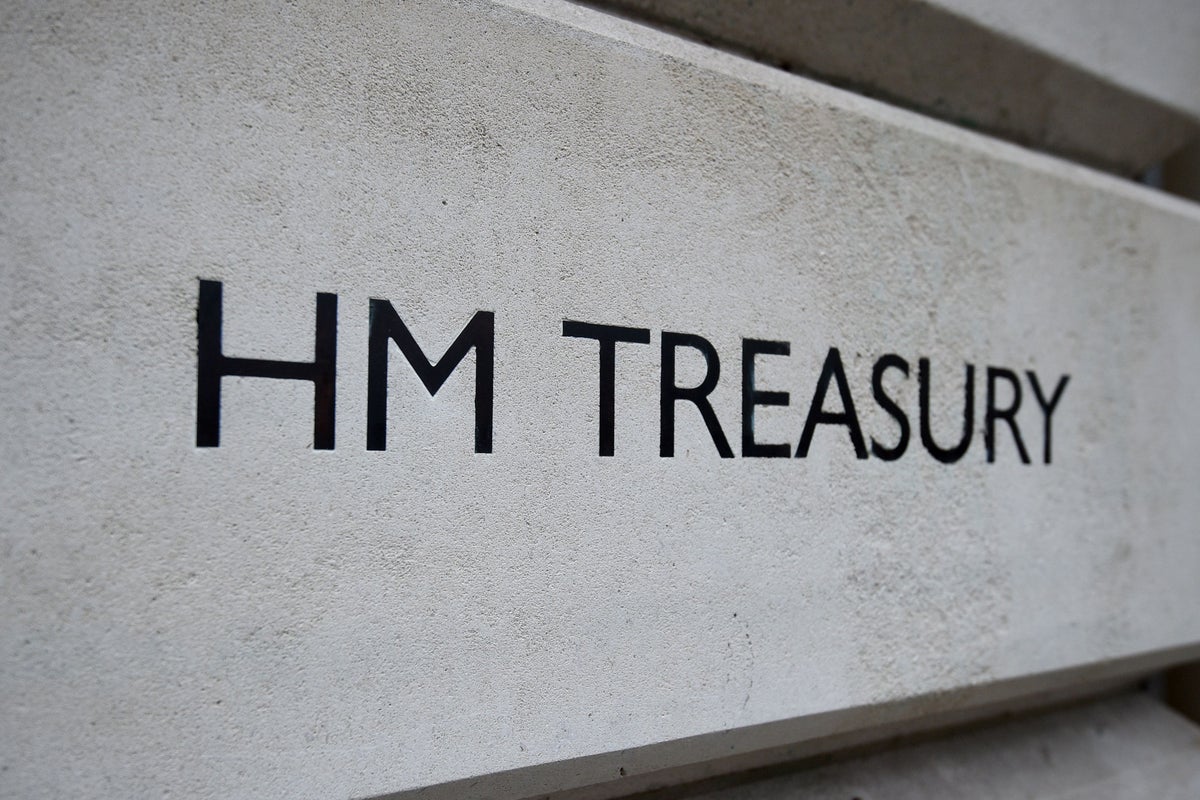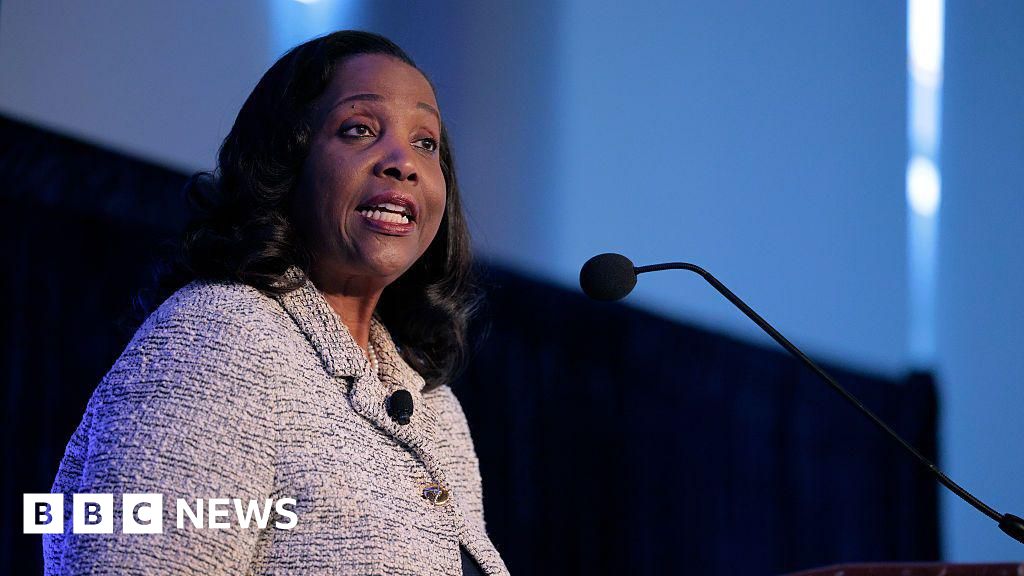Business
UK Government bond sell-off eases after Budget date confirmed

UK long-term borrowing costs have eased back from fresh 27-year highs after the Treasury revealed the keenly-awaited autumn Budget will take place on November 26 – also helping to take the pressure off the pound.
The yield on 30-year UK Government bonds – also known as gilts – edged lower to 5.691% at one stage, having earlier hit a new high not seen since 1998.
Gilt yields move counter to the value of the bonds, meaning their prices fall when yields rise.
The pound, which suffered hefty losses on Tuesday, also reversed early session falls to stand 0.1% higher at 1.341 US dollars and was flat at 1.15 euros.
Financial markets have been heavily focused on the upcoming Budget, with the sell-off in gilts largely down to worries over Britain’s public finances and as investors look for reassurances on how Ms Reeves will plug a black hole in the nation’s public finances – estimated by some to be as much as £51 billion.
But recent pressure on gilts have also come amid a bond sell-off globally, with European and US government bonds likewise seeing yields jump due to political uncertainty and public finance concerns.
Japan was the latest to see its 30-year yield sent soaring as it hit an all-time high on worries over rising debts.
The Governor of the Bank of England has stressed that rising UK long-term government borrowing costs are part of a global pattern and said it is “important not to focus too much” on longer-term bond yields.
It came after the yield on 30-year Government bonds, called gilts, rose to a 27-year high earlier on Wednesday before dropping back later in the session.
Andrew Bailey told the Treasury Select Committee: “We’ve seen a steepening of yield curves across the developed world – the underlying driver of this is global.
“When you look at UK yields regarding the steepening, we are broadly in the middle of the pack. Germany and Japan have gone up significantly more than us, the US less than us.
“It’s important not to focus too much on the 30-year-bond rate.
“It’s a number that gets quoted a lot. It is quite a high number but it is not what is being used for funding at all at the moment actually.
“There is a lot of dramatic commentary on this but I wouldn’t exaggerate the 30-year bond rate.”
Rising yields on these bonds mean it costs more for governments to borrow from financial markets.
But experts believe a driver of weakness in the UK bond market this week could have been compounded by concerns over the Prime Minister’s Government reshuffle on Monday and Chancellor Rachel Reeves’s position.
No 10 insisted on Tuesday that the Chancellor’s authority was not being dealt a blow by Sir Keir Starmer’s shake-up in a bid to calm market jitters.
This week’s reshuffle saw the Chancellor’s deputy, Darren Jones, move into a new role as chief secretary to the Prime Minister.
Health Secretary Wes Streeting told Sky News: “The Chancellor, since she came in last year, has been determined to restore stability to our economy, to get growth back into our economy, and to create the conditions where we can get the nation’s finances back to health.”
He said while there are “encouraging signs”, there is “much more to do”.
Mr Streeting added: “Britain is not out of the woods, and that is why the discipline and the focus that she (the Chancellor) has brought on cost of living, on economic growth and creating the conditions for businesses to be successful is really important, and the discipline we show as a Cabinet in terms of public spending is really important.”
London’s FTSE 100 Index lifted 35.6 points to 9152.3 in Wednesday mid-morning trading, while gold earlier hit new record highs once again – above 3,530 US dollars – as nervous investors flocked to the safe haven asset.
Kathleen Brooks, research director at XTB, said the “focus is likely to remain on the Budget for some time” and cautioned that bond markets will continue to see volatility.
She said: “UK bond yields have been on an upward trajectory for most of this year and have risen significantly since Labour took office.
“The bond market will need some hefty persuading that Labour will rein in public sector spending and bring the UK’s finances under control.
“This is why we expect to see bouts of UK bond market volatility in the coming months.”
Business
Supreme Court sceptical of Trump firing of Lisa Cook

Natalie ShermanBusiness reporter
 Getty Images
Getty ImagesUS President Donald Trump appeared on course for a setback at America’s top court on Wednesday over his unprecedented move to fire a central bank governor.
Supreme Court justices from the left and right asked why they should speed through such an impactful decision, citing concerns about process and implications for central bank independence and the wider economy.
Trump in August said he was removing Federal Reserve governor Lisa Cook, accusing her of engaging in mortgage fraud, which she has denied.
Cook has argued she did not receive due process to dispute those claims, which Fed defenders say were a pretext to allow Trump to assert more control over the bank.
Justice Brett Kavanaugh, a conservative who was appointed by Trump, was among the justices to express sympathy with Cook’s arguments, asking: “What’s the fear of more process here?”
He later warned the administration’s interpretation of the law would “weaken, if not shatter, the independence of the Federal Reserve”.
‘Quite a big mistake’
By law, a president can only remove governors of the Federal Reserve “for cause”.
That requirement was intended to shield the central bank from political pressure and allow it to make policy independently.
The White House contends it has met that bar, accusing Cook of filing mortgage forms claiming two different principal residences at the same time. Banks typically offer lower interest rates for primary homes.
The Trump administration has asked the court to allow the president to remove Cook, a move lower courts had blocked while the case played out.
“Even if it’s inadvertent or a mistake, it’s quite a big mistake,” said solicitor general D John Sauer, who was arguing the case for the administration.
He said such conduct could undermine confidence in the bank and that courts were bound to defer to the president’s judgement when it comes to finding a cause.
He dismissed questions about process, noting that Trump had alerted Cook to the issue on social media before formally firing her.
“There was a social media post,” he said. “And the response was defiance.”
‘Nothing criminal whatsoever’
Cook has denied committing fraud.
In a November letter to the Justice Department, her lawyers said the claims were based on “cherry-picked, incomplete snippets of the full documents”.
They said there was “one stray reference to primary residence” in a mortgage application for an apartment in Alabama, but noted that the file also contained “truthful and more specific disclosures about the property’s use”.
“There is no fraud, no intent to deceive, nothing whatsoever criminal or remotely a basis to allege mortgage fraud,” her lawyers wrote.
Arguing on behalf of Cook, Paul Clement said people in her position should have the chance to present their evidence and be shielded from having a decision made in advance.
He said the administration’s interpretation of the law would make the protection that Congress intended by inserting the “for cause” requirement “toothless”.
Some justices indicated that they shared those concerns.
The “position that there’s no judicial review, no process required, no remedy available, very low bar for cause that the president alone determines – that would weaken if not shatter the independence of the Federal Reserve,” Kavanaugh said.
The lawsuit is seen as high stakes, given swirling debate about Trump’s efforts to influence the Fed, which he wants to lower interest rates more aggressively to boost economic growth.
Federal Reserve chairman Jerome Powell was among the officials expected to attend. He is facing his own criminal probe related to cost overruns during renovations of Fed properties – concerns he has called “pretexts”.
In other recent cases, the Supreme Court, which has a 6-3 conservative majority, has allowed the White House to proceed with firings.
But it has signalled that it views the Federal Reserve, which was designed to set policy independently from the White House, as different.
In a statement after the hearing, Cook’s lawyers said they were “hopeful” the court would recognise the importance of the Fed being able to operate free from political interference.
In her own statement, Cook said: “This case is about whether the Federal Reserve will set key interest rates guided by evidence and independent judgment or will succumb to political pressure.
“For as long as I serve at the Federal Reserve, I will uphold the principle of political independence in service to the American people.”
Several justices, including conservatives, indicated they were hesitant to greenlight Cook’s removal without courts having resolved issues like whether the mortgage filings, which were made before Cook was appointed, would meet the bar for a “for cause” firing.
“We know that the independence of the agency is very important and that that independence is harmed if we decide these issues too quickly and without due consideration,” said Justice Sonia Sotomayor, a liberal. “So to me, waiting to have at least the lower courts look at these issues first makes the most sense.”
“Is there any reason why this whole matter had to be handled by everybody… in such a hurried manner?” asked Justice Samuel Alito, a conservative.
Justice Amy Coney Barrett, another Trump appointee, pressed Sauer to explain what harm the president would suffer by waiting, noting that the court had been warned of potentially dire economic consequences of a decision that could weaken belief in the central bank’s independence.
“There’s a risk,” she said. “Doesn’t that counsel… caution on our part?”
Business
Jamie Dimon says U.S. should impose Trump’s credit card rate cap in Vermont and Massachusetts

Jamie Dimon, CEO of JPMorgan Chase, speaks at the American Business Forum at the Kaseya Center in Miami on Nov. 6, 2025.
Chandan Khanna | AFP | Getty Images
JPMorgan Chase CEO Jamie Dimon on Wednesday advocated for a test of President Donald Trump‘s proposed 10% cap on credit card interest rates in two U.S. states: Vermont and Massachusetts.
Dimon, speaking on a panel at the World Economic Forum at Davos, Switzerland, addressed a question about Trump’s order for banks to voluntarily limit their interest rates for a year. The president had called for the lower rates to take effect Tuesday.
Several large credit card lenders contacted by CNBC on Tuesday said they had made no changes to their interest rates, but they all declined to be identified as defying Trump’s proposal.
“It would be an economic disaster,” Dimon said Wednesday. “In the worst case, you’d have a drastic reduction of the credit card business” for 80% of Americans, he said.
In earnings conference calls last week and behind the scenes, banks have pushed back against Trump’s order this month to voluntarily forgo billions of dollars in revenue.
Their main argument, that price controls will result in lenders canceling accounts for many card customers, has resonated with several Republican lawmakers, including House Speaker Mike Johnson. Most banking analysts believe that Trump would need legislation to enact a nationwide cap on card rates.
‘A great idea’
Dimon then said he had a “great idea” to help quell disagreement over the proposed card cap, suggesting that the U.S. government impose the pricing controls on Americans in just two states.
Vermont and Massachusetts are the home states of Sens. Bernie Sanders and Elizabeth Warren, respectively, both of whom support a bill capping card rates at 10% for five years. Dimon didn’t mention the lawmakers by name Wednesday.
The U.S. government “should force all the banks to do it in two states, Vermont and Massachusetts, and see what happens,” Dimon said, drawing laughter from the audience.
Dimon said “the left” and people who argue for price controls “will learn a real lesson, and the people crying the most won’t be the credit card companies,” he said.
“It’ll be the restaurants, the retailers, the travel companies, the schools, the municipalities, because people miss their water payments,” he said. “It would be something else to watch.”
The offices of Sanders and Warren did not immediately return calls for comment.
Dimon added that JPMorgan was planning on giving the Trump administration its analysis on what would happen under a national credit card rate cap.
“I think it’s wrong for the government to get involved extensively in pricing of stuff, but I got to deal with the world I got,” Dimon said.
Business
Stocks rally as Trump calms Greenland rhetoric

The FTSE 100 shrugged off a weak start to close slightly higher on Wednesday after US president Donald Trump said he would not use force to take control of Greenland, but insisted America must still have “ownership” of it.
Kathleen Brooks, research director at XTB, said Mr Trump’s speech at Davos, in Switzerland, had two key takeaways for markets.
“Firstly, Trump will not take Greenland by force and second, Trump wants the economy to run hot to send US stocks flying north,” she said.
The FTSE 100 index closed up 11.31 points, 0.1%, at 10,138.09.
The FTSE 250 ended 113.42 points higher, 0.5%, at 23,071.29, and the AIM All-Share closed up 7.45 points, 0.9%, at 808.59.
In a wide-ranging, often rambling speech at the World Economic Forum, Mr Trump said: “We probably won’t get anything unless I decide to use excessive strength and force where we would be, frankly, unstoppable, but I won’t do that.”
But he demanded “immediate” talks on Washington’s acquisition of Greenland, renewing his push to seize control of the autonomous territory from Nato ally Denmark.
“It’s the US alone that can protect this giant mass of land, this giant piece of ice, develop it and improve it,” Mr Trump told world leaders.
“That’s the reason I’m seeking immediate negotiations to once again discuss the acquisition of Greenland by the US.”
Prime Minister Sir Keir Starmer earlier told Parliament he would not give in to pressure from Mr Trump over the future of Greenland.
“I will not yield, Britain will not yield on our principles and values about the future of Greenland under threats of tariffs, and that is my clear position,” he told MPs, adding that he would host Danish counterpart Mette Frederiksen in London on Thursday.
Mr Trump has threatened to slap tariffs on Britain and other European countries for opposing his claims on Greenland.
“Greenland could still be an issue for financial markets, since Trump has said that he wants to gain control of Greenland and will start immediate negotiations to do so. However, today’s speech suggests that Nato is not under immediate threat, for now,” Ms Brooks said.
In European equities on Wednesday, markets were mixed. The CAC 40 in Paris closed up 0.1%, while the DAX 40 in Frankfurt ended 0.6% lower.
In New York, financial markets were higher at the time of the London equity market close.
The Dow Jones Industrial Average was up 0.9%, as was the S&P 500, while the Nasdaq Composite climbed 1.0%.
Bond markets were calmer after Tuesday’s sharp moves. The yield on the US 10-year Treasury was quoted at 4.27%, trimmed from 4.28% on Tuesday. The yield on the US 30-year Treasury was quoted at 4.89%, narrowed from 4.91%.
Back in London, analysts played down a surprise spike in UK inflation, calling it a “blip”.
“It was always likely that the December figures would post a rebound on account of the rise in tobacco duty rates showing up in the December data rather than November (as it did in 2024) due to the later timing of last year’s budget,” analysts at Lloyds Bank said.
“Some unwinding of the ‘early’ Black Friday discounting seen in the November data also looks to have been behind the upward move, as well as base effects associated with a sharp rise in airfares last month relative to a more subdued increase in December 2024,” the bank added.
Headline consumer prices index (CPI) inflation accelerated in December, with CPI rising by 3.4% year-on-year, up from 3.2% in November, according to data published on Wednesday by the Office for National Statistics (ONS). It was ahead of the FXStreet-cited consensus of 3.3%.
It was the first time headline inflation has risen since July, when the annual rate rose to 3.8% from 3.6% in June. Figures for October at 3.6% and November at 3.2% were lower than the consensus forecast at the time.
The ONS said alcohol, tobacco and transport made the largest upward contributions to the monthly change.
Core CPI, which excludes energy, food, alcohol and tobacco, was unchanged at 3.2%, better than the 3.3% consensus.
The CPI goods annual rate rose to 2.2% from 2.1%, while the CPI services annual rate rose to 4.5% from 4.4%, but below the 4.6% consensus.
RBC Capital Markets expects the December “blip” to fall away sharply in the first half of 2026.
“Not only therefore did the December outturn leave services and headline CPI inflation broadly in line with the BoE’s (Bank of England’s) projections from November but also the main upward contributions to both headline and CPI were concentrated in non-core or more volatile categories,” the broker said.
Deutsche Bank expects inflation will take a big step down in January, pushing to near 3% year-on-year.
And by spring, the bank expects the BoE’s 2% inflation target “to be in sight”.
The pound was quoted lower at 1.3437 US dollars at the time of the London equities close on Wednesday, compared to 1.3462 dollars on Tuesday.
The euro stood at 1.1707 dollars, lower against 1.1733 dollars. Against the yen, the dollar was trading at 158.18 yen, higher from 157.95 yen.
On the FTSE 100, trading statements boosted Burberry but weighed on Experian.
Luxury goods manufacturer Burberry rose 5.0% after announcing an increase in comparable store sales over the festive period, while it expects its annual adjusted operating profit to be in line with analyst consensus estimates.
Comparable sales by region in the third quarter of financial year 2026, which runs until March 28, were up 6% in Greater China and 5% higher in Asia Pacific. They were up 2% in the Americas. Further, comparable sales were flat in Europe, Middle East, India & Africa due to declines in tourist spend.
Miners were in demand with Rio Tinto, up 5.2% after a well-received fourth quarter production update, and Glencore, which Rio is trying to buy, up 3.7%.
Bank of America said it believes “GlenTinto” – should a deal be sealed – offers “compelling value”.
Rio has until February to firm up an approach for Glencore.
Heading south, insurer Admiral, down 4.2%, after Goldman Sachs downgraded to “sell” from “buy”, while Experian slipped 4.9% despite reporting in-line trading.
On the FTSE 250, Currys shares sparked 7.7% higher as the electricals retailer rose profit guidance, while Premier Foods climbed 7.1% after it signalled top-end full-year profits.
But pub chain JD Wetherspoon failed to cheer investors, with shares down 8.1%, as it said higher costs were offsetting growth in sales.
Brent oil traded lower at 64.82 dollars a barrel on Wednesday, down from 64.89 dollars late on Tuesday.
Gold was quoted at 4,833.66 dollars an ounce on Wednesday, after hitting another record high, up from 4,742.56 dollars on Tuesday.
The biggest risers on the FTSE 100 were Rio Tinto, up 327.00 pence at 6,641.00p, Burberry, up 61.00p at 1,280.00p, Bunzl, up 97.00p at 2,086.00p, Anglo American, up 158.00p at 3,401.00p, and JD Sports Fashion, up 3.78p at 82.06p.
The biggest fallers on the FTSE 100 were Experian, down 157.00p at 3,070.00p, Admiral Group, down 128.00p at 2,948.00p, London Stock Exchange, down 198.00p at 8,782.00p, Rolls Royce, down 26.00p at 1,255.00p and Sage Group, down 16.50p at 1,025.00p.
Thursday’s global economic calendar has public sector net borrowing figures, plus GDP data, initial jobless claims and personal consumption expenditures data.
Thursday’s UK corporate calendar has trading statements from discount retail chain B&M European Value Retail and trading platform AJ Bell.
Contributed by Alliance News
-

 Tech1 week ago
Tech1 week agoNew Proposed Legislation Would Let Self-Driving Cars Operate in New York State
-

 Entertainment1 week ago
Entertainment1 week agoX (formerly Twitter) recovers after brief global outage affects thousands
-

 Politics5 days ago
Politics5 days agoSaudi King Salman leaves hospital after medical tests
-

 Sports7 days ago
Sports7 days agoPak-Australia T20 series tickets sale to begin tomorrow – SUCH TV
-

 Business5 days ago
Business5 days agoTrump’s proposed ban on buying single-family homes introduces uncertainty for family offices
-

 Fashion5 days ago
Fashion5 days agoBangladesh, Nepal agree to fast-track proposed PTA
-

 Tech7 days ago
Tech7 days agoTwo Thinking Machines Lab Cofounders Are Leaving to Rejoin OpenAI
-

 Tech6 days ago
Tech6 days agoMeta’s Layoffs Leave Supernatural Fitness Users in Mourning





